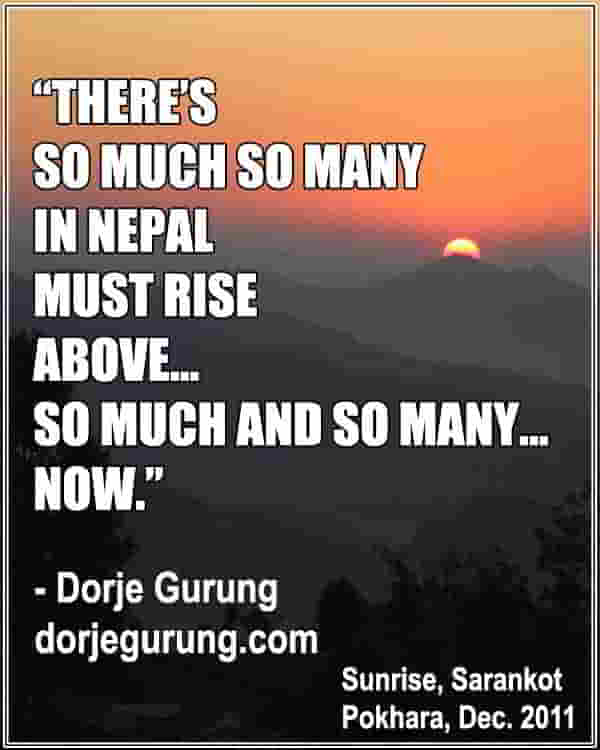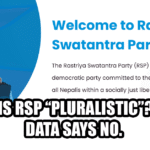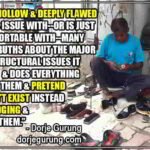
Dear Fellow Nepalis,
I write this not from a place of anger, nor of superiority—but from love. A love heavy with hope, and heavy with sorrow. Because there is so much that so many of us must rise above, because so many of us are so confused and lost, and most importantly, because time is running out.
I know and understand why you take pride in the things you do. I took pride in them too. I grew up in Nepal, brainwashed by poor formal and informal education systems to celebrate the very same symbols:
- to take pride that Buddha was born here, not only because I was born a Tibetan Buddhist,
- to feel a fierce joy that Everest stands on our soil,
- to boast that Nepal was never colonized by foreign powers,
- to admire the bravery of the Bir Gorkhalis,
- to honor Prithvi Narayan Shah as the great “unifier” of our nation,
- to cherish the shape of our flag, and the “religious harmony” we believed existed,
- to take pride in our “unique” culture and traditions, etc.
For at least some years after moving abroad, I carried that pride with me like a badge of honor. But slowly, over the course of nearly twenty-five years of living, working, and traveling across the globe, something shifted. I discovered how–even while Nepali culture, education, and people had convinced me what life is and how it should be lived, what the world is and how I should relate to it etc.–I had been so misled and misinformed. Following that, returning to Nepal, observing and learning about fellow Nepalis closely and intimately with keen interest and curiosity, I discovered how much I would have been lost and confused had I never left the country, and what we must do as a people.
First as an international student and then as an international teacher, while abroad, the more I encountered new places, new ideas, and new friends from all over the world, the more I realized: true pride cannot rest on slogans; true pride must stand the test of honest reflection, and honest reflection demands that we ask harder questions of ourselves and of the stories we have been taught.
We are born into a land of breathtaking beauty and deep contradictions. We inherit names, flags, gods, and histories before we even know how to question them. We are handed pride like an heirloom—pride in our caste, our ethnicity, our history, our survival. But not all inheritances are blessings. Some are burdens disguised as treasures. And if we do not choose carefully what to keep and what to cast aside, they will break us.
Rising Above Divisions and Myths:
We must rise above the labels that divide us—Caste, ethnicity, gender, religion, profession, political allegiance etc. These were not created to free us. They were created to categorize us, to make it easier to decide who is worthy and who is not. I’ll even go as far as to claim that caste specifically was created to steal our own humanity and the humanity of others. (Besides, caste, ethnicity, gender, nation, and nationalities are all social constructs anyway, though that’s a next level conversation.)
We must rise above the myths that trap us—that Prithvi Narayan Shah “unified” our land; that Nepal was “never colonized,” even as the country has been internally colonized by the Khas-Arya exerting dominance over marginalized groups; that Mount Everest and Lumbini somehow guarantee our greatness.
Pride without reflection is poison. It feeds arrogance where we need humility. It feeds ignorance where we need awareness.
We must rise above the fear and insecurity that chain our spirit. We boast loudly about Buddha’s birthplace and the height of our mountains—but how many of our children die climbing the smaller, invisible mountains of illiteracy, hunger, and hopelessness? We shout about “Unity in diversity”—but how often is that just another way of furthering that which is the reason for and entrenches the divisions as well as of demanding silence from those who suffer injustice?
Real pride does not fear criticism. Real patriotism does not tremble before truth.
Addressing Systemic Issues:
Corruption is not a bug in our system—it is the system. Nepotism, incompetence, and apathy thrive, and it is not just in government offices; it’s in how we choose tribal loyalty or allegiance over what is moral or ethical, apathy over courage. Corruption is not just in politics; it is in how we lower our standards for ourselves. Too many of us have accepted “Ke garne?! Yestai ho!” (“What to do?! Such is life/how it is”) as a way of life. We must rise above the broken systems that teach us to expect nothing better.
The education system tells us to memorize, not to think. The political system tells us to obey, not to dream; rewarding loyalty to outdated leaders instead of ideas. But a nation that does not think cannot grow. A people that do not dare to dream cannot be free.
We need to stop waiting for change to come from above or for it to be given to us by this leader or that leader or by some leader yet to arrive on the scene etc. It never will. Change comes when people refuse to accept the unacceptable. When they build new systems with their own hands, hearts, and minds, as Robert M. Pirsig put it in his book Zen and the Art of Motorcycle Maintenance.
I know it is easier to hold on to the old comforts. It is easier to wrap ourselves in old glories and old wounds. It is easier to defend what is familiar than to step into the unknown—by far the biggest source of fear. But comfort is not love. And nostalgia is not nation-building.
We owe it to ourselves—and to the generations that will follow—to become something more than what we have inherited.
To rise above is not to forget where we come from. It is to build, with open eyes and open hands, something better.
I do not write this because I think I am better. I write this because I have discovered every single one of us can be better. Yes, it’s true, I believe that every single one of us is no better than the worst among us. However, every single one of us is no worse than the best among us either. So much of who we are or who we could be is up to us and/or the circumstances.
Having said that, we are better than the divisions we were born into. Better than the myths we were taught to worship. Better than the systems that ask us to settle for so little when we are capable of so much.
Nepal deserves citizens who are not merely proud, but awake. Not merely loyal, but courageous. Not merely survivors of history, but shapers of the future. The mountains are high, yes. But our spirit must be higher.
Rise above. Rise above everything that was designed to keep you small. Rise above—because Nepal needs you whole.
Conclusion: The Fight for a Better Nepal
To rise above is not a metaphor. It is a fight. A daily, exhausting, necessary fight. A fight against laziness, against inherited hatred, against cowardice disguised as culture. A fight to think harder, listen deeper, work smarter, and love more bravely.
We are not bound by the past unless we choose to be. We are not prisoners of our history unless we chain ourselves.
Nepal does not need more blind pride. Nepal needs people willing to break the old patterns—and build something fierce, free, and honest in their place.
The future is not written. It is waiting. Rise above — or be left behind.
With hope,
Dorje
PS. I got help from AI with composing this letter.




